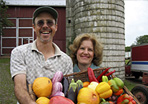Pennington, N.J.

When you pull into the parking lot of Honey Brook Organic Farm, chances are you will find a colorful scene immediately upon opening the door of your car. Produce might be the first thing on your mind and Pink Brandywine tomatoes or candy striped Dolce Di Chioggia beets will certainly delight your senses. But if you take the time to study the cars in the parking lot, you will find a rainbow of political bumperstickers and a group of people from very different cultural backgrounds. Far from being concerned about heated debates on their soil, farmer Jim Kinsel and his wife Sherry Dudas are proud of the diversity that Honey Brook Organic Farm has fostered through food.
One of the first farms in New Jersey to offer a Community Supported Agriculture or CSA program, Honey Brook Organic Farm owes its livelihood to more than two thousand shareholders who pay seasonally for a weekly harvest of fresh, seasonal fruits, veggies and flowers through the twenty-four to twenty-six week growing season. Most people pick up on the farm but some urban residents participate in the Boxed Share Program, which delivers to designated neighborhood drop off spots, so that urbanites get a taste of the farm a little closer to home. With 2,200 members this year, Honey Brook Organic Farm now boasts the largest CSA membership in the US.
The CSA program was established in 1991 by Jim Kinsel on part of the Stony Brook-Millstone Watershed Reserve in Pennington, NJ. It is one of the oldest organic farms in the state and a regional trend-setter in the world of CSA programs. As a new farmer, Jim had the good fortune of finding a generous landlord in the Watershed who not only provided him with land but also all of the equipment to get started. Ever since, this land has been a stronghold for the ideals of healthy soils, good food and strong community.
Sherry and Jim are driven by the conviction that anyone who wants local organic produce should be able to get it. This means reaching out to diverse communities from a variety of cultural and economic backgrounds. When Honey Brook Organic Farm decided to do a box drop in South Trenton, it was the first time that residents of this neighborhood had access to fresh, local, organic produce. “A CSA can really affect who is going to be a member by where they advertise. We did outreach in Trenton through weekly papers and I don’t think anyone else was doing that,” explains Sherry.
Reaching out to urban communities and often minority communities involves a lot more than finding a drop-off site. It means growing the right crops. “If you grow it, they will come,” Sherry fondly quotes her husband Jim’s catch phrase. “We grow strawberries, okra, kale, bok choy, all kinds of crops that aren’t just Euro-Centric.” Such diversity only adds to the colorful atmosphere at Honey Brook Organic Farm. Sherry delights in explaining, “We have members from Brazil, China, India and all over the United States and people love to talk about how they cook their own food.” In this context, there is always something new to learn. “Our African American members have always talked about okra in soul food but now we know that many Indian recipes use it too.”
Price is also an issue that determines who joins. “I tend to agree with the criticism that organic products are really only available to people of a certain income bracket,” Sherry admits. The couple collected a lot of data about the pricing of both organic and conventional crops to price their produce so that they could pay fair wages to the Camancho family, who manage their fields, and make sure that their CSA was affordable. Honey Brook Organic farmshares end up costing about $21 a week for about 45 pounds of produce. “In the end, since many families split their shares, our shareholders end up getting a $60 value for about $10 a week,” Sherry proudly reveals.
When it comes right down to it, Sherry and Jim know that they have something valuable to offer. In closing, Sherry offers this thought; “We have healthy soil, healthy plants and therefore we have healthy fruits and vegetables. People are concerned about what they eat and what they feed their children; they all have that in common. Organic CSAs have the most potential to reach out to the greatest, most diverse numbers of people because there is nothing more real than the food they eat.”
Date: 9/12/2006


